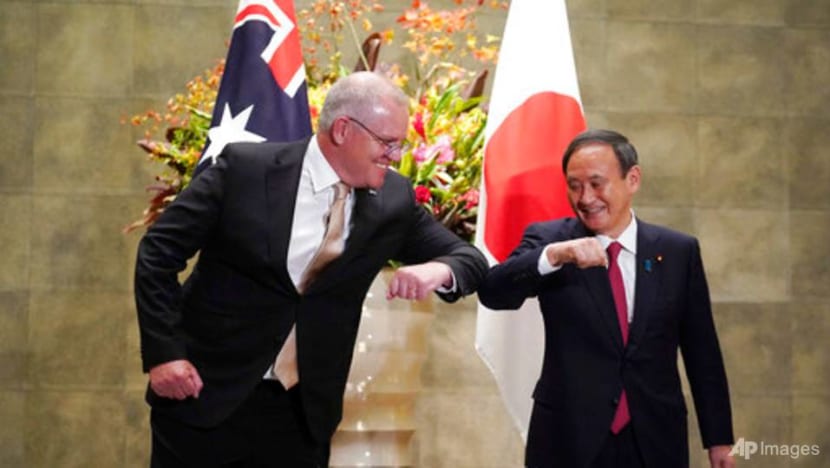Australia, Japan to bolster defence ties amid China's rise

Australian Prime Minister Scott Morrison (left) and Japanese Prime Minister Yoshihide Suga (right) bump elbows to greet prior to the official welcome ceremony at Suga's official residence in Tokyo, Nov 17, 2020. (Photo: AP/Eugene Hoshiko, Pool)
TOKYO: The leaders of Australia and Japan held in-person talks on Tuesday (Nov 17) to bolster defence ties between the two US allies to counter China's growing assertiveness in the Asia-Pacific region amid the transition in American leadership.
The two countries are close to concluding a Reciprocal Access Agreement, a legal framework to allow their troops to visit each other's countries to conduct training and joint operations.
During the talks in Tokyo, Australian Prime Minister Scott Morrison and his Japanese counterpart, Yoshihide Suga, were expected to further discuss the deal, though it was not immediately clear whether it would be finalised. They were also expected to discuss the coronavirus and the economy, Japanese officials said.
READ: Japan and Australia seek to align on defence as China's regional influence grows
If signed, the deal would be Japan's first such pact since the 1960 status of forces agreement with the United States, which set bases for about 50,000 American troops to operate in and around Japan under the Japan-US security pact.
Japan is committed to maintaining and deepening its 60-year-old alliance with the US as the cornerstone of its diplomacy and security, but has in recent years sought to complement its regional defence by stepping up cooperation with others, especially Australia, amid China's growing maritime activity that has spread from the East and South China seas and beyond.
Japan still sticks to self-defence and bans first strikes under its postwar pacifist Constitution, but bolstered its defence role and spending under former Prime Minister Shinzo Abe.
READ: Abe plan for land-attack counterpunch could mark major military shift for Japan
Abe pushed Japan's military cooperation and weapons compatibility with the US as its forces increasingly work alongside US troops. He also bolstered purchases of costly American stealth fighters and other arsenals.
Suga, who took office in mid-September after Abe resigned due to ill health problems, is carrying on his predecessor's diplomatic and security policies.
READ: Japan's military asks new government to continue strengthening of armed forces
Japan considers Australia as a semi-ally and the two countries signed a defence cooperation agreement in 2007, a first for Japan with a country other than the US.
The two nations agreed on the sharing of military supplies in 2013, expanding the deal in 2017 to include munitions after Japan eased restrictions on arms equipment transfers.
Japan has initiated a "Free and Open Indo-Pacific" vision of economic and security cooperation as a counter to China's influence, and recently hosted foreign ministerial talks among the countries known as the Quad that also include the US, Australia and India.
Those four nations are now seeking to bring in more countries, from Southeast Asia and beyond, that share concerns about China's increasing assertiveness in the region.
China defends its actions in the regional seas as peaceful and denies violating international rules. It has criticised the Quad as a North Atlantic Treaty Organization (NATO) in Asia to counter China.
Despite its pacifist Constitution, Japan's defence spending ranks among the world's top 10, according to the Stockholm International Peace Research Institute. Australia ranks among the top 15.












